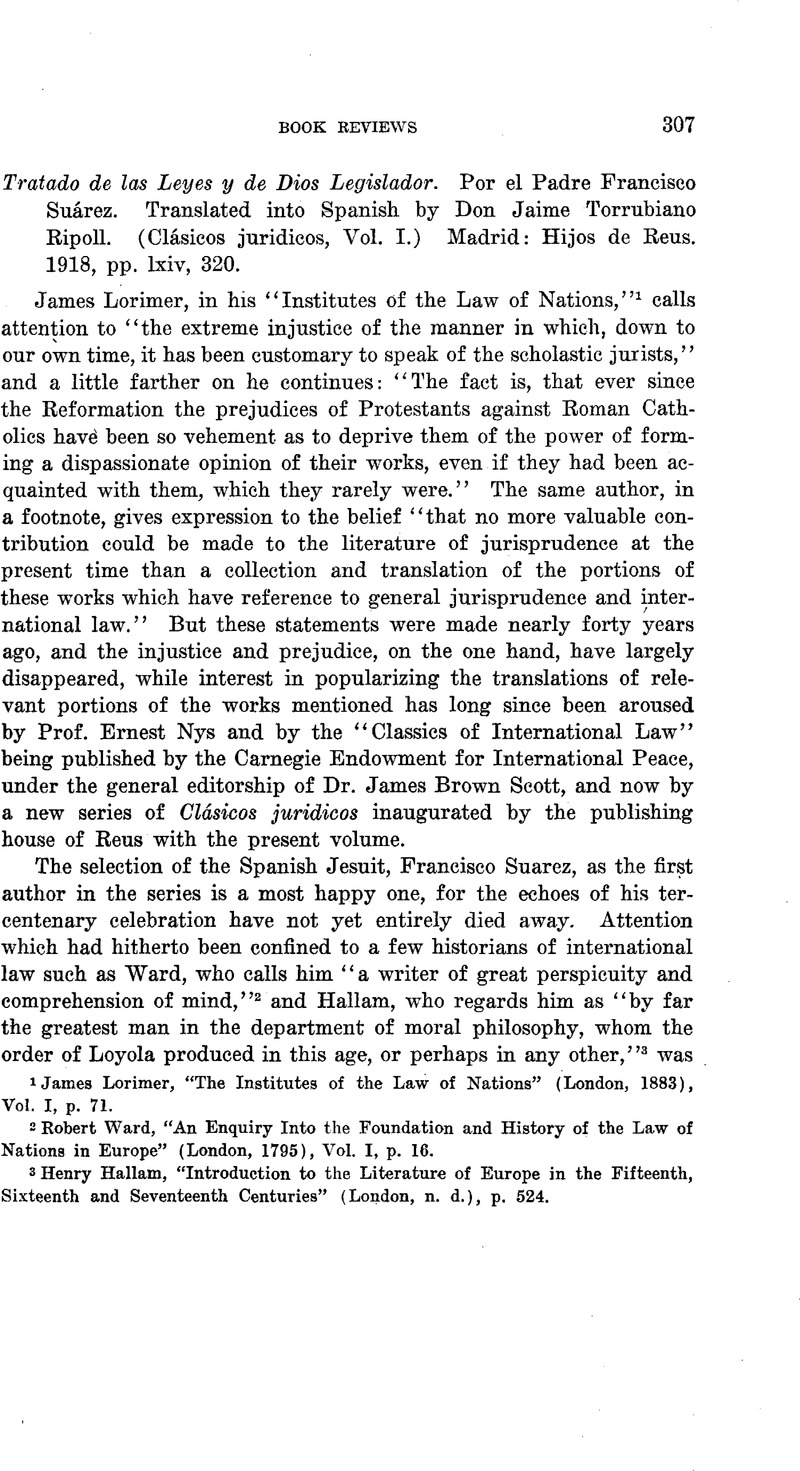No CrossRef data available.
Article contents
Tratado de las Leyes y de Dios Legislador. Por el Padre Francisco Suárez. Translated into Spanish by Don Jaime Torrubiano Ripoll. (Clásicos jurídicos, Vol. I.) Madrid: Hijos de Reus. 1918, pp. lxiv, 320.
Review products
Published online by Cambridge University Press: 04 May 2017
Abstract

- Type
- Book Reviews
- Information
- Copyright
- Copyright © American Society of International Law 1920
References
1 James Lorimer, “The Institutes of the Law of Nations” (London, 1883), Vol. I, p. 71.
2 Ward, Robert, “An Enquiry Into the Foundation and History of the Law of Nations in Europe” (London, 1795), Vol. I, p. 16 Google Scholar.
3 Henry Hallam, “Introduction to the Literature of Europe in the Fifteenth, Sixteenth and Seventeenth Centuries” (London, n. d.), p. 524.
4 Cf. Walker, Thomas Alfred, “A History of the Law of Nations” (Cambridge, 1899), Vol. I, p. 330 Google Scholar.
5 Cf. ibid., p. 156.
6 Westlake, John, “Chapters on the Principles of International Law” (Cambridge, 1894), pp. 27–28 Google Scholar.
7 Ward, op. cit., Vol. II, p. 614.
8 Hugo Grotius, Ep. 154, J. Cordesio.
9 This work and relevant portions of the De legibus will appear in text and English translation in the Classics of International Law.
10 In the last line on p. 3, it might be more in keeping with the spirit of the syllogistic argument to have pero in place of y. On p. 15, in the quotation from Romans, ch. ii, v. 13, the translation for the word justificaiuntur is missing. On the bottom of p. 16, there is a slightly twisted translation of a sentence which would appear in English somewhat as follows: “The rules of correct speech are wont to be called laws of grammar,” etc. On p. 19, line 19, naturalmente should be moralmente. Eight lines farther on, y should be deleted.
11 The most important misprints noted are the following: 1691–92 for 1601–02 and 1691–93 for 1601–03 (p. xliv), 1659 for 1859 (p. li), Creseomium for Cresconium, gestione for gestis (p. 23), Beviculus for Breviculus (p. 24), Catenas for Categorias, Toscorum for Stoicorum, Sylbug for Sylburg (p. 26), Heilberg for Heidelberg, Herbetus for Hervetus, Wutzburgo for Wurzburgo, Klolt for Klotz, Pentatenchi for Pentateuchi, virtutuum for virtutum (p. 27), Batone for Botone (p. 46), Liguano for Lignano, Aucarano for Ancarano (p. 47), Perisiense for Parisiense (p. 89), and Panarmitano for Panormitano (p. 182). The frequency with which Latin words are misspelled may be judged from the following list: ommnibus, Defenssio, inteligentia, mendatium, mayor, Accademicae, arnititia, Lelius, juditia and comentaria. Several instances of incorrect division of Latin words at the ends of lines are to be found, e. g., qtiaes-tiones, appellationes.
12 Francisco Suarez, De Verbo Incarnato, quoted in the Preface, p. xxiii.


